- Home
- Robin Cook
Charlatans Page 2
Charlatans Read online
Page 2
“Excellent.” Then Martha called out to one of the attendants tasked to take patients into the changing area where they would get out of their clothes and put on hospital gowns. She handed Bruce’s folder to him. “Good luck,” she added to Bruce. “And next time be on time!”
Bruce gave her a thumbs-up and a guilty smile, and followed the attendant.
After getting out of his clothes and struggling into the hospital gown, Bruce lay down on a gurney and pulled a sheet up under his armpits. Another nurse appeared, dressed in surgical garb, one of the few nurses he didn’t know. She introduced herself as Helen Moran and asked the same questions Martha had asked. Then she marked Bruce’s right hip with an indelible marker after confirming with him the side to be operated on. “My orders are to move you along at top speed,” she said. “I’ll let anesthesia know you are on your way over. They have been looking for you.”
Bruce nodded. He felt progressively embarrassed at having been late to Admitting and appreciative of the extra attention he was getting because of it. He figured it was due to a large degree that Dr. Mason was his surgeon. An orderly appeared just after Helen left, unlocked the gurney, and then maneuvered it out into the hallway. His name was Calvin Wiley. Bruce didn’t know him, but he knew Bruce. “You are a VIP,” Calvin said as he wheeled the gurney along the tortuous route toward the operating suite. “I was told you were one of Dr. Mason’s patients and I was to get you up to the surgical holding area on the double.”
“Hardly a VIP,” Bruce responded, but he was pleased. As he had assumed, having Dr. Mason as his surgeon was a major plus. He just hoped his being late wouldn’t screw things up.
Calvin deposited Bruce in the pre-anesthesia holding area in a cubicle defined by curtains. As soon as he left, two nurses appeared: Connie Marchand and Gloria Perkins. Bruce knew both of them, because both commuted to and from the medical center by car. After a bit of banter, mostly about Bruce’s children, Gloria left. Connie went over the paperwork, checked the inked X on Bruce’s right hip, and went through the same questions Martha and Helen had asked. Satisfied that all was in order, Connie gave Bruce’s arm an endearing squeeze and told him that she would let anesthesia know that he was there. “I imagine one of the anesthesiologists will be by right away,” Connie said. “We’ve gotten a few calls about your whereabouts. Dr. Mason doesn’t like to wait.”
“So I hear,” Bruce said. “My bad! Sorry! I was a bit late to Surgical Admitting. Will everything be okay?”
“It should be all right,” Connie assured him.
A few minutes later the curtain was pulled aside and a youthful woman with arctic-blue eyes and tanned skin came to Bruce’s side. She was dressed in blue scrubs, including a hood that completely covered her hair. In a direct and pleasant fashion, she introduced herself as Dr. Ava London, one of the staff anesthesiologists, and then added: “I will be helping Dr. Mason take care of you this morning, Mr. Vincent, while he fixes your hernia. I must say it is a pleasure to meet you. I’ve heard that you are quite a popular guy and that the darling photos I’ve seen on the cafeteria bulletin board are your children.”
“I oversee hospital parking,” Bruce explained, already liking this attractive and personable anesthesiologist. “I am surprised I haven’t met you. Are you new to the staff?”
“Relatively new,” Ava said. “But it is coming up on five years.”
“That is not new,” Bruce said, a tad chagrined, as he prided himself on his knowledge of the medical center’s staff. “I guess you don’t use the garage.”
“No need. I’m able to walk to the hospital,” Ava said as she looked through the paperwork on the clipboard at the foot of Bruce’s gurney. “I live nearby, on Beacon Hill.” She immediately noticed there was no corroborating note by a junior surgical resident. She asked Bruce why.
“Martha Stanley felt there was no need, because Dr. Mason’s fellow had done the history and physical just a few days ago. Truthfully, it was my fault. I was late getting to Surgical Admitting. They wanted to get me over here ASAP.”
Ava nodded. A fellow, having already completed his surgical residency, was certainly more qualified than a junior surgical resident. She glanced through the history and physical. It was totally negative for any medical problems except the run-of-the-mill inguinal hernia. Satisfied that all was in order, she put the clipboard back onto the gurney and reestablished eye contact with Bruce. “So it seems you are in good health.”
“I think so. Can we speed this up? I don’t want Dr. Mason upset that I was a bit late checking in.”
“It is important to do this right. I need to ask you a few questions. I see there is no history of medical problems, particularly no problems with your heart and lungs.”
“None.”
“And you have never had anesthesia?”
“Never.”
“And you haven’t eaten since midnight.”
“Dr. Mason’s fellow said I was going to have spinal anesthesia.”
“That is correct. Dr. Mason’s secretary specifically let us know that the doctor requested spinal anesthesia. Are you okay with that? You know what it is?”
“I do. Actually, I know most of the anesthesiologists and nurse anesthetists, who have told me all sorts of things about anesthesia.”
“An informed patient! That’s helpful for sure. But you realize we have to have consent to use general anesthesia in case there is any problem with the spinal.”
“What kind of a problem are you talking about?”
“The chances of a problem are very small, but we have to be prepared. For instance, if the surgery takes longer than expected and the spinal begins to wear off, we must be prepared to give you general anesthesia. For that reason, we need consent just to cover all the bases. That’s why we are interested in whether you have any problems with your lungs.”
“No problems with my lungs.”
“How about reflux disease?”
“I’m fine! Really, I am. Are you sure we are not holding Dr. Mason up?”
“There is no problem about holding up Dr. Mason, believe me. Now, let’s talk about the spinal. Do you know that we have to put a needle in your back to enable us to give you the anesthetic agent?”
“Yes. I know all about it. Dr. Mason’s fellow gave me the complete rundown and assured me that I won’t feel anything.”
“That is correct. You won’t feel any pain during the operation. I will make absolutely sure of it. But tell me: Do you have any back problems that I should know about?”
“Nope. Back’s fine.”
“Good. What will happen is that when we get you in the room, you will be asked to sit on the side of the operating table with your face and head resting in a support. You will feel a pinch when I put some local anesthetic into the skin of your lower back before putting in the spinal needle. Once the medicine has been introduced into your spine, we will help you lie back down on the table. Now, a question for you: During the operation, do you want to be awake and possibly watch if Dr. Mason is okay with it, or would you prefer to be asleep? Either way, you definitely will feel no pain, and I will be with you for the whole procedure.”
“I want to be asleep! I don’t want to watch anything.” As comfortable as Bruce was with being in the hospital, there was no way he wanted to watch someone cut into him.
“Okay, fine. Then you will be asleep. Now I ask again, have you eaten anything since midnight?”
“No.”
“And you have no known allergies to any medication?”
“No allergies.”
“And you are not taking any drugs, prescribed or otherwise?”
“No drugs.”
“Excellent. Now I will start an IV and get you down to the operating room. I’ve been told Dr. Mason is nearly ready for you. Do you have any questions for me?”
“I can’t think of any,” Bruce said. For the first ti
me, a slight shiver of fear raised a few hackles on the back of his neck. The reality of what he was facing was finally sinking in: He was in the hands of the surgical team and no longer in control of his life.
Dr. London started the intravenous line with such skill and rapidity that Bruce was surprised when it was done. As comfortable as he was with the hospital environment, he fully admitted he never liked venipuncture and always turned his head to the side. “Wow!” he commented. “I hardly felt that. I guess you have started a few IVs.”
“A few,” Ava said. She knew she was good at it, just like she knew she was good at anesthesia in general. She was also sensitive to her patients’ mental state and detected a slight shift in Bruce’s demeanor. “How do you feel? Are you anxious?”
“A bit nervous,” Bruce admitted. His voice, which had been strong and self-assured, now wavered slightly.
“I can give you something to calm you down if you would like,” Ava said, hearing the hint of anxiety.
“I would like,” Bruce said without hesitation.
With a syringe and a medication vial she had in her pocket for this very reason, she quickly gave Bruce four milligrams of her favorite premedication drug, midazolam. Then she disposed of the paraphernalia she’d used to get the IV going, released the brake on Bruce’s gurney, and without waiting for an orderly, pushed Bruce out into the main room, heading for the OR suite.
“I can feel that medication already,” Bruce admitted as he watched the recessed ceiling lights pass overhead. The fear he’d had moments earlier had miraculously already vanished. He felt the need to talk. “When do I get to see Dr. Mason?”
“Soon. I was told he is waiting on us, which is why I’m taking you down to your operating room myself without waiting for an orderly.”
If someone had asked him, Bruce would have said he felt a little tipsy as he entered OR 8 and glanced around at the scene. Almost a year ago he’d had a tour of the new hybrid operating rooms when they had been completed, so he wasn’t surprised by the exotic cream-colored booms hanging from the ceiling or the banks of video monitors or the window looking out at the central desk. As the gurney was guided alongside the operating table, he saw that the scrub nurse was already gowned and masked and busy arranging instruments. He didn’t recognize her with so little of her face visible, but he did recognize the tall circulating nurse, Dawn Williams, who he knew drove a white Ford Fusion. She recognized Bruce in return.
“Welcome, Mr. Vincent,” Dawn said cheerfully as she came around the end of the gurney to help Ava transfer Bruce onto the operating table. “We are going to take especially good care of you just like you do with all our cars.” She let out a bit of muffled laughter.
“Thank you,” Bruce said, as he put his legs over the side of the operating table to face the doughnut-shaped support for his head. His eyes scanned the room for Dr. Mason, but the surgeon was not there. “Where is Dr. Mason?”
“He will be here as soon as we let him know you are all ready for him,” Dawn said.
“Is he still in on his first case?” Ava asked as she and Dawn helped position Bruce with his head in the support. It was a general rule that anesthesia was not started until the surgeon was physically present and part of what was called the “pre-op huddle,” when the surgeon, the anesthesiologist or anesthetist, and the circulating nurse went over the case to make sure everyone was on the same page with all the details. Unfortunately, that was not always the situation with Dr. Mason and a few other members of the surgical hierarchy who were known to flaunt some of the rules in favor of maximizing their productivity. The problem was: They got away with it.
“Yes. Dr. Mason is still in OR fourteen,” Dawn said, “but the OR supervisor said Mason wants us to go ahead and get Mr. Vincent ready for him.”
“Okay,” Ava said with resignation. She donned sterile gloves and began the prep of Bruce’s lower back. She wasn’t happy about starting the case before having laid eyes on Mason, and it wasn’t the first time she’d been put in the same uncomfortable position with him. On five previous occasions, he had insisted she start anesthesia before he was even in sight, much less in the room. Ava liked to do things by the book, believing it was key to patient safety, and starting anesthesia before the surgeon was physically present was a definite violation of her sense of good medical practice.
If truth be told, Ava did not like working with the egotistical Dr. Mason. She was uncomfortable that he felt entitled to bend the rules due to his professed superstar status. Intuitively, she knew that if there was ever a problem on a case, he would not take responsibility and that she would undoubtedly have to bear the burden as the fledgling anesthesiologist. Yet as bad as this concern was, it was not the only reason she wasn’t fond of working with him. She was one of the few single female anesthesiologists on staff and certainly the youngest, and Mason had come on to her on more than one occasion, just as he had done with some of the female anesthetists and OR nurses. He had even called her at home on several occasions, supposedly about discussing upcoming cases, and suggested he “pop” over since he was in the neighborhood, though Ava had always demurred. Although appalled at this behavior, Ava had not communicated her true feelings, as she was afraid to make an enemy of the man. Nor had she said anything to the chief of anesthesia, Dr. Madhu Kumar, who had hired her, since he, too, was in Dr. Mason’s league as a titan in his field, and the two were close. It was Dr. Kumar who did the anesthesia for Dr. Mason’s VIP patients from around the world, just as he was doing that day. Yet for Mason’s less highfalutin patients who were below Dr. Kumar’s interest, such as Bruce Vincent, Mason usually asked for Ava.
The first thing Ava did after the prep of Bruce’s lumbar region was to raise a small wheal with local anesthetic at the site where she would place the spinal needle. After checking to make sure the stylet was properly seated, Ava skillfully pushed the spinal needle into Bruce’s back. “You will feel a little pressure,” she said to him. Within seconds she felt the first pop as the needle penetrated the ligamentum flavum, and a moment later the second pop when it went through the dural covering of the spinal canal. When she was certain as to the proper position of the needle, she introduced the spinal anesthetic bupivacaine. As usual for Ava, the procedure went entirely smoothly. A moment later, she and Dawn helped Bruce lie back down on the operating table.
“My legs don’t feel any different,” Bruce said. He was clearly worried that the anesthesia wasn’t going to work on him.
“It takes a few minutes,” Ava explained as she attached Bruce to all the monitoring devices she had at her disposal. When she was finished and everything was entirely normal, including the ECG, breathing rate, and level of anesthesia, she added a proper dose of propofol as a hypnotic. At exactly 9:58 A.M., Bruce Vincent lost consciousness and fell asleep. By reflex, Ava glanced again at the continuous recordings of Bruce’s vital signs. Nothing had changed, and she began to relax. The beginning of a case was always the most anxiety-producing for her.
Over the next forty minutes, Ava found herself getting increasingly irritated. Despite repeated inquiries out to the OR desk as to Dr. Mason’s ETA and multiple reassurances that his presence was imminent, he still hadn’t appeared. As the time dragged on, Ava faulted herself for having started the spinal when she did. Although she was confident the dose she had given could last as much as two hours more, which was plenty of time for a simple hernia repair, she thought it was inconsiderate for the patient to be waiting for the surgeon, who should have been there from the beginning.
“Dawn!” Ava called out finally, her patience at an end. “Go out to the main desk and demand to know exactly what the hell is going on and when Dr. Mason is going to appear! Talk to Janet Spaulding directly. Let her know the patient’s spinal has been in place for more than a half hour.” Janet Spaulding was the supervisor of the OR and a force to be reckoned with. If anyone could get results, Janet could. She was a fixture in the OR a
nd didn’t take grief from anyone.
Ava exchanged an exasperated glance with Betsy Halloway, the scrub nurse, who had been standing motionless the entire time with her gloved hands clasped over her chest. She had the instruments laid out and covered with a sterile towel. She’d been ready for even longer than Ava had.
Ava scanned Bruce’s data. Everything was normal, including his body temperature. Ava had Dawn put a warm blanket over him when it had become clear Mason was going to be delayed.
Dawn returned quickly. “Good news,” she reported. “Wild Bill will be here momentarily. He is out of OR fourteen. There had been some sort of an unexpected congenital abnormality of the biliary tree in his first patient that required him to spend more time than he’d planned.”
“Good Lord,” Ava mumbled. She looked over her shoulder and through the window to see if Dr. Mason was at the scrub sink, but no one was there. “So where the hell is he?”
“He went into OR sixteen, where his second team is opening up his second pancreatic patient.”
“Which means he is responsible for three patients under anesthesia,” Ava said derisively.
“But Janet said he will be here in a second. She promised.”
“Where is Dr. Kumar?”
“No idea. Probably going back and forth between the two rooms. He does that sometimes.”
“Give me a break,” Ava said to herself, thinking it was a good thing the general public didn’t know this kind of thing went on in a major teaching hospital. Out of the corner of her eye she saw movement in the scrub room. Turning her head, she saw Dr. Mason putting on a surgical mask while talking and laughing with another younger man whom Ava did not recognize. Ava took a deep breath to calm herself.
Five minutes later Dr. Mason breezed into the room. “Hello, everybody,” he said with alacrity. “I want you all to say hello to Dr. Sid Andrews. He is to be my new fellow starting July first, but he generously volunteered to come in today to give me a hand with this hernia repair. It has been a while since I’ve done a hernia, so I thought it couldn’t hurt.” He laughed as if he’d just said something absurd about him needing help.

 Shock
Shock Mutation
Mutation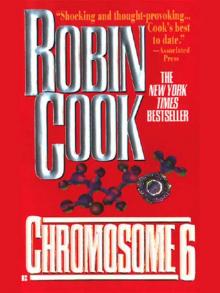 Chromosome 6
Chromosome 6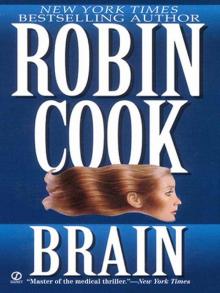 Brain
Brain Intervention
Intervention Invasion
Invasion The Legend of Parzival: The Epic Story of His Quest for the Grail
The Legend of Parzival: The Epic Story of His Quest for the Grail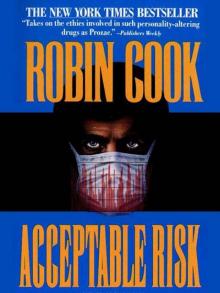 Acceptable Risk
Acceptable Risk Cell
Cell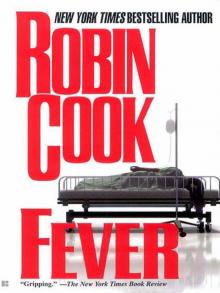 Fever
Fever Death Benefit
Death Benefit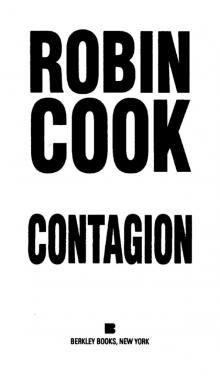 Contagion
Contagion Mindbend
Mindbend Coma
Coma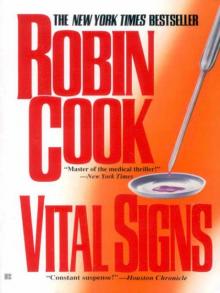 Vital Signs
Vital Signs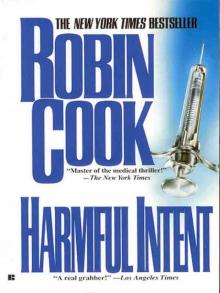 Harmful Intent
Harmful Intent Critical
Critical Foreign Body
Foreign Body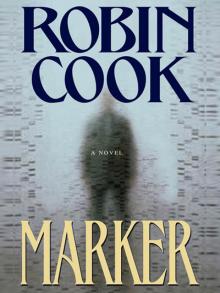 Marker
Marker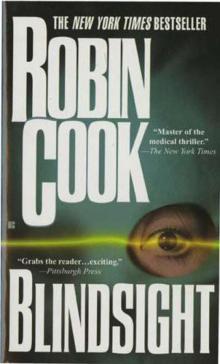 Blindsight
Blindsight Terminal
Terminal Sphinx
Sphinx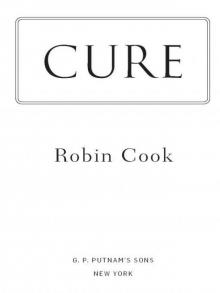 Fatal Cure
Fatal Cure Host
Host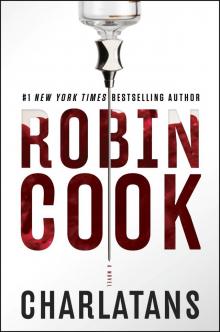 Charlatans
Charlatans Crisis
Crisis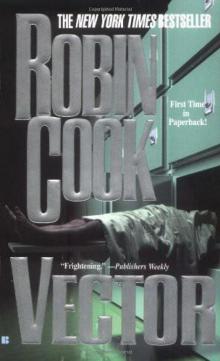 Vector
Vector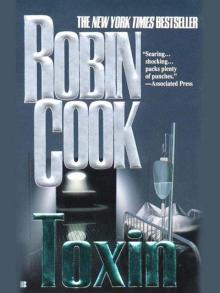 Toxin
Toxin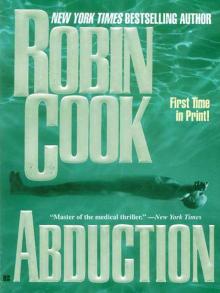 Abduction
Abduction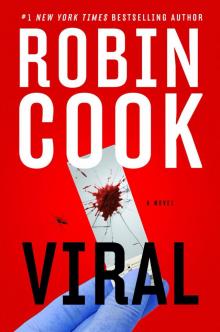 Viral
Viral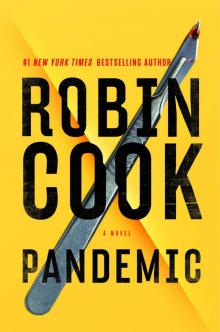 Pandemic
Pandemic Outbreak
Outbreak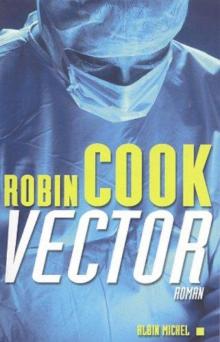 Vector js&lm-4
Vector js&lm-4 Godplayer
Godplayer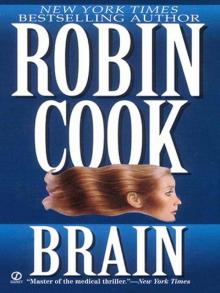 A Brain
A Brain Year of the Intern
Year of the Intern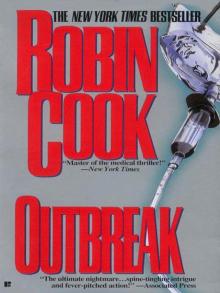 Outbreak dmb-1
Outbreak dmb-1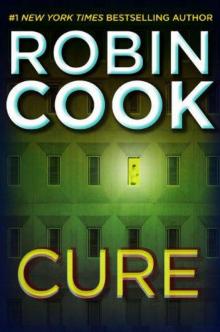 Cure
Cure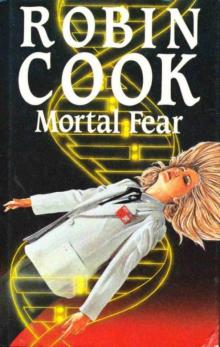 Mortal Fear
Mortal Fear The Legend of Parzival
The Legend of Parzival Vital Signs dmb-2
Vital Signs dmb-2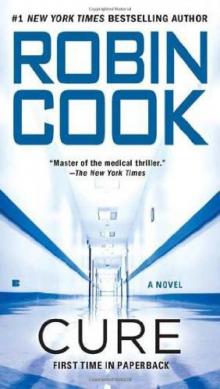 Cure (2010) sam-10
Cure (2010) sam-10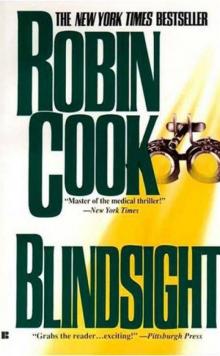 Blindsight sam-1
Blindsight sam-1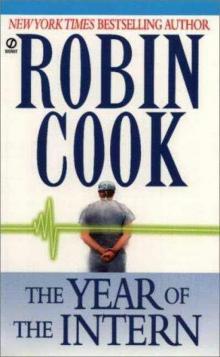 The Year of the Intern
The Year of the Intern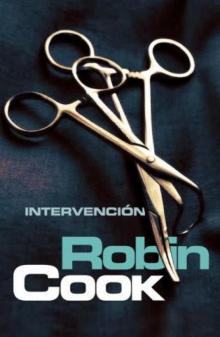 Intervention sam-9
Intervention sam-9 Foreign Body sam-8
Foreign Body sam-8